高一英语必修一Unit4重点词汇解析
高中英语必修一unit 4 词汇讲解【精讲 精析 归纳】分解
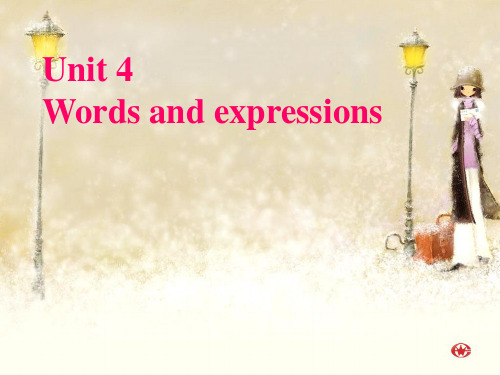
The boy buried the dead bird in the backyard. 男孩们把死鸟埋在后院。
▪ vt. 使沉浸(或专心于) be buried in thought bury oneself in study
出神深思 埋头研究
bury one's face in hands 双手掩面
by the end of到……结束时;到……时为止
(常与完成时态连用)
on end竖着,直立;连续的 come to an end结束 bring sth to an end=put an end to sth
(使)结束;终止 make ends meenedt收up支in相pr抵iso;n 量入为出 end up… (wi以th牢)/(狱in生) (活以而…结…束)结束
ruin
▪ V.毁坏、毁灭、使破产
▪ n. 毁灭,崩溃,覆灭
The castle has fallen into ruin. ▪ in ruins :severely damaged or destroyed. eg. An earthquake left the whole town in ruins.
shelter
▪ n. 庇护所,避难所,遮蔽物 a shelter for the homeless In the storm I took shelter under a
tree . ▪ v. 庇护,掩蔽,保护
The plants must be sheltered from direct sunlight.
destroy
▪ v. The fire destroyed most of the building.
▪ destroyer 破坏者, 消灭者, 驱逐舰 队
高一英语必修一Unit4重要知识点总结词汇
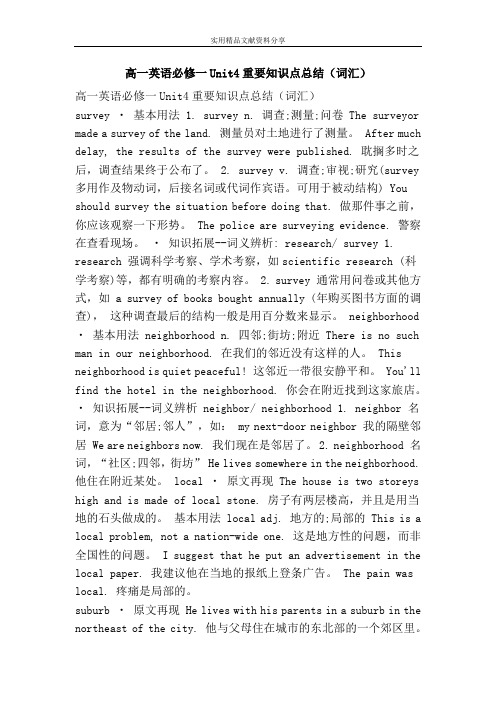
高一英语必修一Unit4重要知识点总结(词汇)高一英语必修一Unit4重要知识点总结(词汇)survey ・基本用法 1. survey n. 调查;测量;问卷 The surveyor made a survey of the land. 测量员对土地进行了测量。
After much delay, the results of the survey were published. 耽搁多时之后,调查结果终于公布了。
2. survey v. 调查;审视;研究(survey 多用作及物动词,后接名词或代词作宾语。
可用于被动结构) You should survey the situation before doing that. 做那件事之前,你应该观察一下形势。
The police are surveying evidence. 警察在查看现场。
・知识拓展--词义辨析: research/ survey 1. research 强调科学考察、学术考察,如scientific research (科学考察)等,都有明确的考察内容。
2. survey 通常用问卷或其他方式,如 a survey of books bought annually (年购买图书方面的调查),这种调查最后的结构一般是用百分数来显示。
neighborhood ・基本用法 neighborhood n. 四邻;街坊;附近 There is no such man in our neighborhood. 在我们的邻近没有这样的人。
This neighborhood is quiet peaceful! 这邻近一带很安静平和。
You'll find the hotel in the neighborhood. 你会在附近找到这家旅店。
・知识拓展--词义辨析 neighbor/ neighborhood 1. neighbor 名词,意为“邻居;邻人”,如: my next-door neighbor 我的隔壁邻居 We are neighbors now. 我们现在是邻居了。
人教版高一 英语必修一unit4重点单词和短语
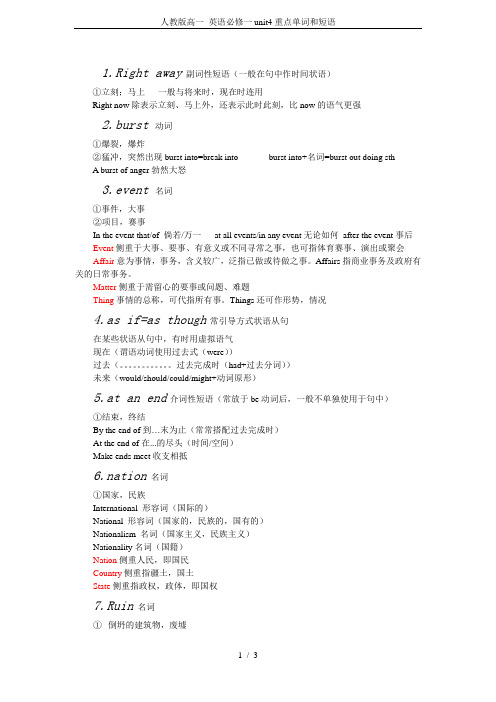
2使愤慨,使生气
名词
1令人震惊的情况,消息
Be a shock to sb对某人来说是一个打击
11.Rescue名词
1救援,营救
动词
1拯救,解救
Rescue sb/sth from….把某人/某物从…解救出来
12.Trap动词
1困住,关住,使陷入危险中
Make ends meet收支相抵
6.nation名词
①国家,民族
International形容词(国际的)
National形容词(国家的,民族的,国有的)
Nationalism名词(国家主义,民族主义)
Nationality名词(国籍)
Nation侧重人民,即国民
Country侧重指疆土,国土
State侧重指政权,政体,即国权
动词
1跟踪,追踪
Back on track恢复正常,重新步入正轨
Be on track步入正轨
Lose track of不了解…的动态,于…失去联系
Track dog警犬
Track event竞赛项目
10.Shock动词
1使震惊,使惊愕,使难以置信
Be shock at对…震惊be shock to do sth惧怕做某事
14.bury动词
①埋葬
②埋藏
Bury oneself=be buried in=devote oneself to=be devoted to专心于…献身于…
1.Right away副词性短语(一般在句中作时间状语)
①立刻;马上一般与将来时,现在时连用
Right now除表示立刻、马上外,还表示此时此刻,比now的语气更强
高中英语必修一unit 4 词汇讲解【精讲 精析 归纳】

trap
n. 陷阱;圈套;埋伏,老鼠夹
The police set a trap for the thieves. vt. 使陷入困境 trap—trapped--trapped She was trapped in the burning house. was caught in was stuck in
(常与完成时态连用)
on end竖着,直立;连续的 come to an end结束 bring sth to an end=put an end to sth (使)结束;终止 end 收支相抵;量入为出 up in prison make ends meet 以牢狱生活而结束 end up… (with)/(in) (以„„)结束
injure
v. to hurt oneself /sb /sth physically He fell off the bicycle and injured his arm. She was serious injured in a road accident.
destroy
v. The fire destroyed most of the
(1)Not all the children were vaccinated. 并不是所有的孩子都注射了疫苗。 [朗文] (2)I wanted some string but there was none in the house. 我需要一些绳子,但家里一根也没有。 [牛津] 直通高考——看看高考怎么考 (1)Surely ________ of the others had been as excited as I. (2011·浙江卷·阅读D篇)
人教版高一英语必修一第四章知识点整理
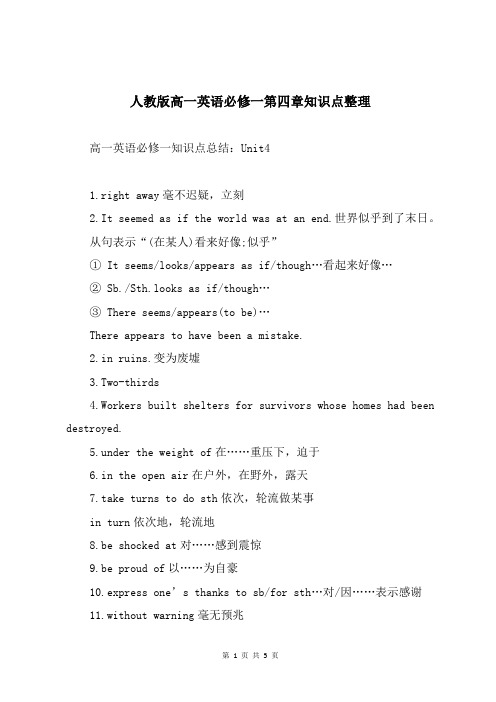
人教版高一英语必修一第四章知识点整理高一英语必修一知识点总结:Unit41.right away毫不迟疑,立刻2.It seemed as if the world was at an end.世界似乎到了末日。
从句表示“(在某人)看来好像;似乎”① It seems/looks/appears as if/though…看起来好像…② Sb./Sth.looks as if/though…③ There seems/appears(to be)…There appears to have been a mistake.2.in ruins.变为废墟3.Two-thirds4.Workers built shelters for survivors whose homes had been destroyed.5.under the weight of在……重压下,迫于6.in the open air在户外,在野外,露天7.take turns to do sth依次,轮流做某事in turn依次地,轮流地8.be shocked at对……感到震惊9.be proud of以……为自豪10.express one’s thanks to sb/for sth…对/因……表示感谢11.without warning毫无预兆12.next to紧接着,相邻,次于13.get away from…避免,摆脱,离开14.disaster-hit areas灾区15.Listening to English is a very important skill because it is only when we understand what is said to us that we can have a conversation with somebody.听英语是一项很重要的技能,因为只有当我们懂得别人给我们说什么我们才能与他交谈。
英语必修一Unit 4 Earthquakes词汇句子解析
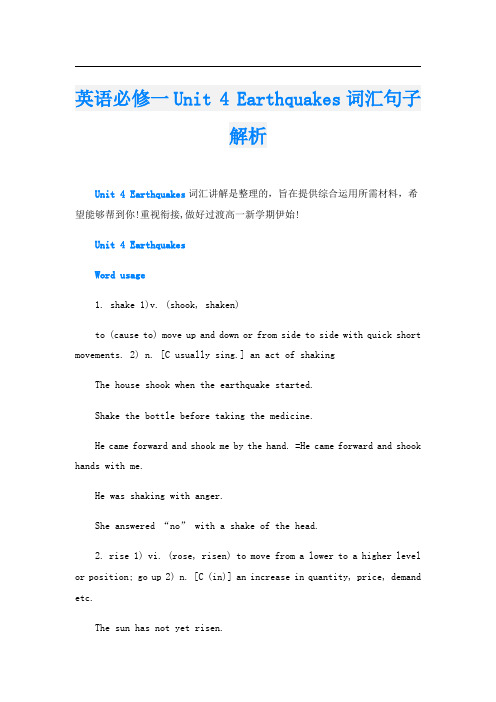
英语必修一Unit 4 Earthquakes词汇句子解析Unit 4 Earthquakes词汇讲解是整理的,旨在提供综合运用所需材料,希望能够帮到你!重视衔接,做好过渡高一新学期伊始!Unit 4 EarthquakesWord usage1. shake 1)v. (shook, shaken)to (cause to) move up and down or from side to side with quick short movements. 2) n. [C usually sing.] an act of shakingThe house shook when the earthquake started.Shake the bottle before taking the medicine.He came forward and shook me by the hand. =He came forward and shook hands with me.He was shaking with anger.She answered “no” with a shake of the head.2. rise 1) vi. (rose, risen) to move from a lower to a higher level or position; go up 2) n. [C (in)] an increase in quantity, price, demand etc.The sun has not yet risen.The population of the city has risen to five million.He rose and left the room.There will be a rise in unemployment next year.Theres been a sharp rise in the cost of living.2. pond n. an area of still water smaller than a lake, especially one that has been artificially madeSome cattle were drinking at the pond.There are some fish living in the pond.When an earthquake is coming, fish will jump out of ponds.3. burst 1) v. to (cause to ) break open or break apart suddenly and violently, usually as a result of pressure from within and often cause the contents to become widely scattered.2) n. an act of result of bursting; (of) a sudden short period of great activity, loud noise, strong feeling; outbreakThe balloon burst.After ten days of rain the river burst its banks.A burst of hand-clapping followed the ending of the song.4. canal n. an artificial stretch of water dug in the ground to allow ships or boats to travel alongit, or to bring water to or remove water from an areaCoal used to be sent here by canal.Canals have been built to irrigate the desert.The Panama Canal joins two oceans.5. steam n. [U] 1) water in the state gas produced by boiling2) power or effort produced by steam under pressure, and used for making things work or moveWho invented the steam engine?Steam was used to be the power of a train.There is steam bursting from that hole.6. ruin 1. n. a) [U] the cause or state of destruction and decayb) [C] a building that has been badly damaged or destroyed2. vt. a) to spoil or completely destroy a person or thingb) to cause someone to loss all their moneyThe temple has fallen into ruin.We visited the ruins of the temple.The heavy rain ruined our holiday.The hurricane ruined all the houses here.The flood ruined the crops.If I lose my lawsuit(官司), the cost will ruin me.7. injure vt. to cause physical harm to (a person or animal), especially in an accident; hurt seriously; to damageI hope I didnt injure her feelings.His back was injured.Two people were killed and seven were injured.His reputation will be badly injured by the vicious rumour.8. destroy vt. to damage sth so severely that it can not be repaired; put an end to the existence of; ruinA fire destroyed the house.What he said destroyed our last hope.All hopes of peaceful settlement were destroyed by his speech.9. brick n. [C,U] 1) a hard piece of baked clay used for building2) sth. in the shape of a brickThey used yellow bricks to build the house.The tower is made of bricks.Bricks covered the ground like red autumn leaves.10. useless adj. not of any useThis knife is so blunt. Its useless.I realized it was useless to reason with him.I was useless at maths. = My maths is very poor.11. shock 1) n. a) [C, U] a violent force from sth such as explosion,a crash or a hard blowb) [C, U] the feeling you get after sth unexpected and usually very unpleasant has suddenly happened, or you have received an unexpected piece of newsc) the poor medical condition of someone who has an accident and whose heart and lungs are not working properly2) v. to make someone feel very upset, angry, or unpleasantEarthquake shocks are often felt in Japan.The news of his death was a shock to us.The traffic accident sent him into a state of shock.They were shocked by her rudeness.We were shocked by his sudden death.12. rescue v. to save someone or sth from harm or dangerHe rescued three children from the burning building.The life boat was sent out to rescue the sailors from the sinking ship.The boy was rescued after hours at sea.13. disaster n. [C,U] a sudden event causes great loss or harmWe were all shocked by the disaster.The earthquake is one of the worst natural disasters the country has ever suffered. People began to wonder how long the disaster would last.14. organize v. to plan and arrange an event; to arrange things ina sensible orderWell organize an oral English contest.The story is very well organized.They organized the truckers into a union.15. shelter 1) n. a) [U] protection, especially from bad weather or danger b) a building that protects you from weather or danger.2) vt. to protect someone or sth from bad weather or danger;vi. to stay in a place in order to be protected from bad weather or dangerThe umbrella is a poor shelter from heavy rain.Their immediate need is for food, clothing and shelter.The wall sheltered us from the wind.She was accused of sheltering a murderer.She wad sheltered by the USA.In the rain people were sheltering in the doorways of shops.16. fresh adj. 1) new and different (only before a noun ); 2) recently picked, caught, produced and therefore in good condition (used of food);3) clean, cool and pleasantThey buy fresh meat.This kind of fish lives in fresh water.She is fresh from university.She is quite fresh to office work.17. percent n. parts for each 100The bank has increased its interest rate by one percent.Over ninety percent of the islanders here are illiterate.He spends a large percent of his income on food and drink.18. speech n. 1) [C] a formal talk to a group of listeners2) [U] the ability to speak or the act of speaking3) [U] way of speakingThe chairman made an opening speech.She is researching speech development in children.We express our thoughts by speech.By your speech I can tell youre from Hong Kong.19. judge 1) vi. vt. to decide who or what is the winner in a competition2) [vt. + that] to form or give an opinion about someone or sth after careful thoughtjudging from, judging by…3) n. a public official who has the power to decide questions brought before a court of law; a person who has the knowledge and experience to give an opinion about the value of sthYou cant judge a book by its cover.He is going to judge the first race.We must judge whether he is guilty.The prisoner was taken before the judge.He was one of the judges at the horse race.20. honour 1) n. a) [U] great respect and admirationb) [sing] sth that brings great respect and pride2) v. to show respect to sb. or to praise sb. publiclyWe fight for the honor of our country.He is an honor to our school.Children should be taught to show honor to their elders.He honors his teachers.20. prepare 1) vt. to make sth. ready for a future event or action 2) vi. to get ready to do sth.They prepared themselves for the worst.When we arrived home, mother had already prepared dinner for us.I was preparing for bed when I heard a knock at the door.Useful expressions1. right awayat once ; in no time; immediatelyI will return the book right away.I am getting in touch with him right away.We are about to start right away.2. end1) at an endfinish; overIt seems that the world was at en end.2) bring… to an end =put an end to…I wonder how I can bring the dispute to an end.=I wonder how I can put an end to the dispute.3) come to an endThe meeting came to an end at midnight.4) at the end of…At the end of the road there is a shop.5) by the end of…How many English words have you learned by the end of last term?6) in the end =at last; finallyHe will be a scientist in the end.3. dig out1) to get sth out of a place, using a spade or your hands2) to find sth you have not seen for a long time, or that is not easy to findLets dig out the roots.Why did you dig out all those old magazines?We must dig the truth out of him.1. a (good \ great \ large) number of+ n.(pl.)many; a large quantity of; a lot ofA good number of students are not interested in modern art.Ive seen the film a number of times.The Great Wall attracts a great number of foreign tourists every day.the number of…The number of private colleges has increased.= Private colleges have increased in number.5.give out1) to give sth to a number of different people, especially to give information to people2) to produce light, heat, a sound, a gas, smell etcYou have no right to give my telephone number out.Students were giving out leaflets(传单)to everyone on the street.The teacher gave out the examination papers.The radiator (散热器) is giving out a lot of heat.与give有关的常用短语还有:give away 送掉,捐赠give in 让步,屈服give off 发出(气味、光、热、声音等),此时相当于give outgive up放弃give back 归还6.thousands of基数词+s,并不表示确切的具体数字,可以单独使用,也可以先接介词of 再接复数名词。
高中英语必修一词汇表Unit 4含教材例句及词汇用法讲解
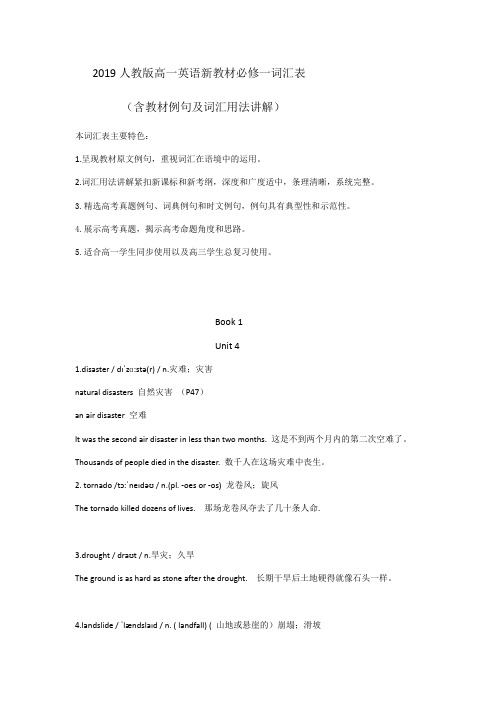
2019人教版高一英语新教材必修一词汇表(含教材例句及词汇用法讲解)本词汇表主要特色:1.呈现教材原文例句,重视词汇在语境中的运用。
2.词汇用法讲解紧扣新课标和新考纲,深度和广度适中,条理清晰,系统完整。
3.精选高考真题例句、词典例句和时文例句,例句具有典型性和示范性。
4.展示高考真题,揭示高考命题角度和思路。
5.适合高一学生同步使用以及高三学生总复习使用。
Book 1Unit 41.disaster / dɪˈzɑ:stə(r) / n.灾难;灾害natural disasters 自然灾害(P47)an air disaster 空难It was the second air disaster in less than two months. 这是不到两个月内的第二次空难了。
Thousands of people died in the disaster. 数千人在这场灾难中丧生。
2. tornado /tɔ:ˈneɪdəʊ / n.(pl. -oes or -os) 龙卷风;旋风The tornado killed dozens of lives. 那场龙卷风夺去了几十条人命.3.drought / draʊt / n.旱灾;久旱The ground is as hard as stone after the drought. 长期干旱后土地硬得就像石头一样。
ndslide / ˈlændslaɪd / n. ( landfall) ( 山地或悬崖的)崩塌;滑坡The village was destroyed by a landslide. 滑坡摧毀了村庄。
The heavy rain caused the landslide. 大雨引起山体滑坡。
5.slide / slaɪd / vi. & vt. (slid, slid ) (使)滑行;滑动We slid on the ice. 我们在冰上滑行。
高一英语必修一unit4知识点总结大全

高一英语必修一unit4知识点总结大全高一英语必修一unit4知识点总结重点词汇、rightaway立刻,马上(=atonce=innotime)asleep睡着的;熟睡地(fallasleep入睡)sleep睡;睡眠sleepy犯困的itseemsthat/asif…看来好像…;似乎inruins成为废墟thenumberof…的数量(做主语时,谓语动词用单数)anumberof大量(做主语时,谓语动词用复数)betrapped被困howlong多长时间howoften多久一次,指频率howsoon还要多久(用于将来时当中,用in+时间段回答)hundredsofthousandsof成千上万的digout挖出shake泛指“动摇,震动”,常指左右、上下动摇,也可以指人“震惊,颤抖”例:Shefelttheearthshakingunderhim.Shewasshakenwithanger.quake指较强烈的震动,如地震Thebuildingquakedonitsfoundation.tremble指人由于寒冷、恐惧、不安等引起的身体的抖动或声音的颤抖例:SuddenlyIsawherlipsbegintotrembleandtearsbegintoflowdownhercheeks.shiver多指寒冷引起的颤抖、哆嗦例:Asuddengustofcoldwindmademeshiver.rise(rose—risen)vi,上升;升起,无被动语态giveriseto引起raise(raised—raised)vt,举起;筹集;养育arise(arose—arisen)vt,出现(常指问题或现象)injure常指因意外事故造成的损伤,也可以指感情上名誉上的伤害例:Hewasinjuredinacaraccident.harm泛指“伤害,损害”,既可以指有生命的,也可以指无生命的例:Hewasafraidthathisfury(暴怒)wouldharmthechild.Hisbusinesswasharmedforsomereason.hurt既可以指肉体上的伤害,也可以指精神上的伤害例:Shehurtherlegwhenshefell.Hefelthurtatyourword.wound一般指枪伤、刀伤等在战场上受的伤例:Thebulletwoundedhiminthearm.bepreparedfor…=makepreparationsfor…为…做准备inone’shonor向…表示敬意;为纪念be/feelhonoredtodo…做…感到很荣幸make/give/deliveraspeech发言openingspeech开幕词give/provideshelterto…向…提供庇护所seekshelterfrom…躲避happentodosth.偶然;碰巧happen指偶然发生takeplace指事先计划好的事情发生高一英语必修一知识点重点句型Thenumberofpeoplewhowerekilledorinjuredintheearthquakereachedmorethan400,000.(定语从句)死伤的人数达到40多万。
人教高中英语必修一 Unit 4课本知识点复习
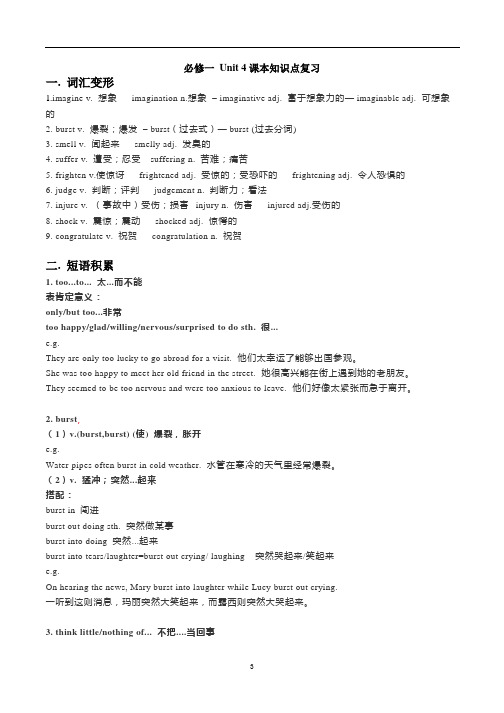
必修一Unit 4课本知识点复习一. 词汇变形1.imagine v. 想象-- imagination n.想象– imaginative adj. 富于想象力的— imaginable adj. 可想象的2. burst v. 爆裂;爆发– burst(过去式)— burst (过去分词)3. smell v. 闻起来-- smelly adj. 发臭的4. suffer v. 遭受;忍受-- suffering n. 苦难;痛苦5. frighten v.使惊讶-- frightened adj. 受惊的;受恐吓的-- frightening adj. 令人恐惧的6. judge v. 判断;评判-- judgement n. 判断力;看法7. injure v. (事故中)受伤;损害--injury n. 伤害-- injured adj.受伤的8. shock v. 震惊;震动-- shocked adj. 惊愕的9. congratulate v. 祝贺-- congratulation n. 祝贺二. 短语积累1. too...to... 太...而不能表肯定意义:only/but too...非常too happy/glad/willing/nervous/surprised to do sth. 很...e.g.They are only too lucky to go abroad for a visit. 他们太幸运了能够出国参观。
She was too happy to meet her old friend in the street. 她很高兴能在街上遇到她的老朋友。
They seemed to be too nervous and were too anxious to leave. 他们好像太紧张而急于离开。
2. burst(1)v.(burst,burst) (使) 爆裂,胀开e.g.Water pipes often burst in cold weather. 水管在寒冷的天气里经常爆裂。
高一英语必修一Unit4知识点详尽解析
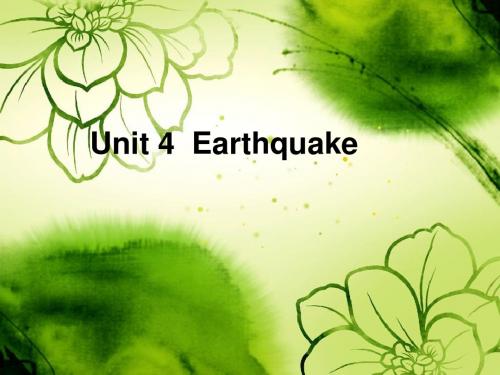
think badly/poorly /ill of 对……看法不好,评价很低
think well/much / highly/a lot/ a great deal of 对……重视/高度评价
1.校长对你的进步评价很高。
The headmaster thought highly of your progress.
5. Tens _________________ of thousands of (数万) people _____________ are dancing (dance) in the big square now. 6. There were ____________ ten thousand (一万) students taking part in the exam yesterday. 7. _________________ 90% / 90 percent (百分之九十) of the mountain __________ is covered (cover) by trees.
Fish jumped out of bowls and ponds.
Mice ran out of the fields
There were cracks on the wells. The water in the well rose and fell.
The Second Paragraph
was One third of the apple ___ bitten by mice.
请根据提示完成下列句子。 1. One-third ________ (三分之一) of the students are (be) girls. in our class ____ 2. Three-fifths __________ (五分之三) of the soil __________ was washed (wash) away by the flood last night. Half (一半) of the desks in this 3. ______ are made (make) in his company. school ________ 4. ______ Most (大部分的) of the lecture he made yesterday ______ was (be) interesting.
Unit 4 Natural Disasters 词汇知识点 高一英语(人教2019版必修第一册)
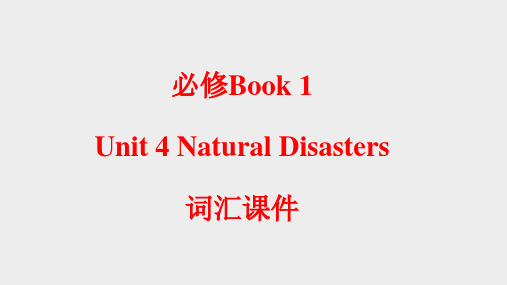
• 复活; (使)苏醒
• 【同根词】
• revival n[U]&[C]振兴;复苏
effort
•n
• ①[U]&[C]气力;精力 • be (well) worth the effort 值得努力 • without effort毫不费力地 • ②[C]努力;尽力 • make an effort/efforts to do sth 努力做某事 • spare no effort不遗余力 • ③[C] [常用于名词后]有组织的活动
destroy
• vt
• ①毁坏;摧毁;毁掉。 • ②消灭;杀死
• 【同根词】
• destruction n[U]毁坏,毁灭 • destructive adj.具有毁灭性的
evacuate
•v
• ①vt (把人从危险的地方)疏散;撤离 • ②vt&vi (从危险的地方)撤出;撤空
helicopter
pipe
•n
• [C]&[U]管子;导管;烟斗
whistle
• vi
• 吹口哨;鸣笛
•n
• [C]哨子;口哨
emergency
•n
• [C]&[U]紧急情况;突发事件;非常时刻 • an emergency exit 紧急出口
• 【同根词】
• emergent adj.紧急的
calm
• adj
context
•n
• [C]&[U](文章的)上下文;语境; (事情发生的)背景
suffer
•v
• ①vi&vt患(病); (因疾病)受苦 • suffer from...遭受...(疾病) • ②遭受(困难等) • ③(事情)变差;变糟
高中英语必修一词汇表Unit4含教材例句及词汇用法讲解

2019人教版高一英语新教材必修一词汇表(含教材例句及词汇用法讲解)本词汇表主要特色:1.呈现教材原文例句,重视词汇在语境中的运用。
2.词汇用法讲解紧扣新课标和新考纲,深度和广度适中,条理清晰,系统完整。
3.精选高考真题例句、词典例句和时文例句,例句具有典型性和示范性。
4.展示高考真题,揭示高考命题角度和思路。
5.适合高一学生同步使用以及高三学生总复习使用。
Book 1Unit 41.disaster / di'z a:sts(r) / n.灾难;灾害natural disasters 自然灾害 (P47)an air disaster 空难It was the second air disaster in less than two months.这是不到两个月内的第二次空难了。
Thousands of people died in the disaster.数千人在这场灾难中丧生。
2. tornado /t3:'neidsu / n.(pl. -oes or -os) 龙卷风;旋风The tornado killed dozens of lives.那场龙卷风夺去了几十条人命.3.drought / draut / n.旱灾;久旱The ground is as hard as stone after the drought.长期干旱后土地硬得就像石头一样。
1.1andslide / 'l出ndslaid / n. ( landfall)(山地或悬崖的)崩塌;滑坡The village was destroyed by a landslide.滑坡摧毁了村庄。
The heavy rain caused the landslide.大雨引起山体滑坡。
5.slide / slaid / vi. & vt. (slid, slid )(使)滑行;滑动We slid on the ice.我们在冰上滑行。
人教版高一英语必修一unit4知识点讲解

人教版高一英语必修一unit4知识点讲解Unit 4 Knowledge Points ExplanationUnit 4 of the People's Education Edition for Grade 11 English textbook covers various knowledge points related to the theme of "Earthquakes". In this unit, students will acquire a deeper understanding of earthquake-related vocabulary, grammar structures, and reading skills. Without further ado, let us delve into the essential concepts covered in this unit.I. Vocabulary1. Earthquake-related vocabulary: In this section, students will learn key earthquake vocabulary such as tremor, magnitude, epicenter, seismograph, and aftershock. It is crucial to have a firm grasp of these terms to effectively communicate and understand information about earthquakes.2. Synonyms and antonyms: This module aims at enhancing students' lexical range by exploring synonyms and antonyms of common words. By learning synonyms and antonyms, students canimprove their ability to express ideas in a more nuanced and precise manner.II. Grammar1. Passive voice: Unit 4 focuses on the use of passive voice. By understanding and practicing the construction of passive sentences, students can accurately convey earthquake-related information, such as "The city was devastated by the earthquake."2. Attributive clauses: This section introduces attributive clauses, or relative clauses, which provide additional information about a noun. Students will learn how to use relative pronouns (who, which, that) to modify nouns in their writing and speaking.III. Reading Skills1. Skimming and scanning: Skimming and scanning are two essential reading skills that help students quickly locate relevant information in a text. Students will learn how to skim and scan passages about earthquakes to extract key details and main ideas efficiently.2. Understanding text structure: This module focuses on recognizing different text structures, such as cause and effect, compare and contrast, and problem and solution. By familiarizing themselves with these structures, students can better understand the organization of a text and extract relevant information more effectively.IV. Writing Skills1. Descriptive writing: In this part, students will develop their descriptive writing skills by describing earthquakes and their impact. They will learn how to use vivid language and sensory details to create a more engaging and informative description.2. Paragraph organization: This module emphasizes the importance of coherent paragraph organization. Students will learn how to structure paragraphs logically, ensuring a smooth flow of ideas and providing clear topic sentences and supporting details.V. Listening and Speaking Skills1. Note-taking in lectures: This section focuses on effective note-taking skills during lectures. Students will practice listening to earthquake-related information and summarize the key points in their own words.2. Group discussions: Students will participate in group discussions on various topics related to earthquakes. This activity aims to improve their ability to express opinions, engage in meaningful conversations, and collaborate with peers.In conclusion, Unit 4 of the People's Education Edition for Grade 11 English provides comprehensive knowledge points that enable students to expand their vocabulary, enhance grammar skills, improve reading comprehension, develop writing proficiency, and strengthen listening and speaking abilities. By mastering these knowledge points, students will be better equipped to comprehend and discuss earthquake-related topics, both academically and in real-life situations.。
高一必修一unit4知识点
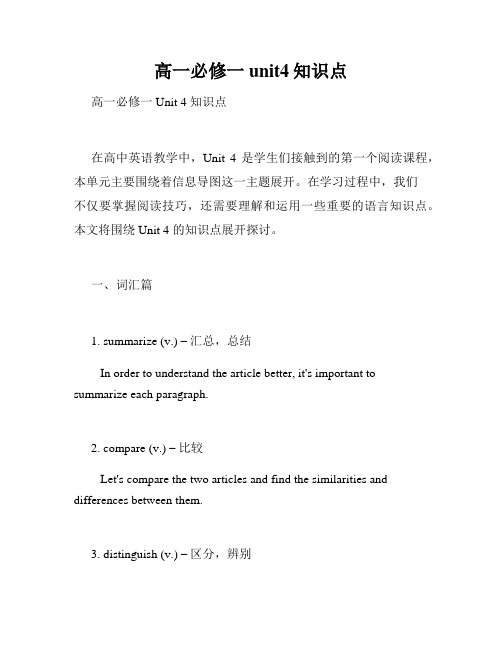
高一必修一unit4知识点高一必修一 Unit 4 知识点在高中英语教学中,Unit 4 是学生们接触到的第一个阅读课程,本单元主要围绕着信息导图这一主题展开。
在学习过程中,我们不仅要掌握阅读技巧,还需要理解和运用一些重要的语言知识点。
本文将围绕 Unit 4 的知识点展开探讨。
一、词汇篇1. summarize (v.) –汇总,总结In order to understand the article better, it's important to summarize each paragraph.2. compare (v.) –比较Let's compare the two articles and find the similarities and differences between them.3. distinguish (v.) –区分,辨别It is difficult to distinguish between twins because they look so similar.4. distinguish…from… –将…与…区分开来It is important to distinguish fact from fiction when reading news sources.5. classify (v.) –分类,归类The books in the library are classified according to genre and author.6. edit (v.) –编辑,剪辑The editor will edit your article before it is published.7. revise (v.) –修订,修改Before submitting the essay, make sure to revise and correct any grammatical errors.8. transfer (v.) –转移,转换The teacher encouraged the students to transfer their knowledge from the textbook to real-life situations.二、语法篇1. used to do sth. –过去常常做某事(现在不做了)I used to play basketball every Sunday, but now I prefer swimming.2. be used to –习惯于After living in the city for a year, I am used to the noise and fast pace of life.3. be/get accustomed to –习惯于She got accustomed to waking up early after a week of early morning meetings.4. be/get used to –习惯于After wearing glasses for a month, she finally got used to them.5. prefer…to… –更喜欢…而不是…I prefer watching movies to reading books because they are more visually stimulating.6. instead of –代替,而不是Instead of going out, I decided to stay at home and work on my homework.7. neither…nor…–既不…也不…Neither John nor Jane enjoys playing video games.8. both…and… –既…and…Both the teachers and the students participated in the school's charity event.三、阅读理解在阅读理解中,我们需要掌握一些常用的阅读技巧,如略读、精读、找关键词等。
高一(上)英语必修一Unit4-Earthquakes重点单词短语归纳整理
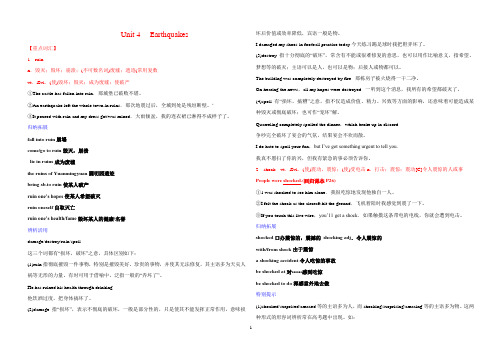
Unit 4 Earthquakes【重点词汇】1 ruinn.毁灭;毁坏;崩溃;(不可数名词)废墟;遗迹(常用复数vt.&vi.(使)毁坏;毁灭;成为废墟;使破产①The castle has fallen into rain.那城堡已破败不堪。
②An earthquake left the whole town in ruins.那次地震过后,全城到处是残垣断壁。
‘③It poured with rain and my dress got/was mined.大雨倾盆,我的连衣裙已淋得不成样子了。
归纳拓展fall into ruin崩塌come/go to ruin毁灭,崩溃lie in ruins成为废墟the ruins of Yuanmingyuan圆明园遗迹bring sb.to ruin使某人破产ruin one’s hopes使某人希望破灭ruin oneself自取灭亡ruin one’s health/fame毁坏某人的健康/名誉辨析活用damage/destroy/ruin/spoil这三个词都有“损坏,破坏”之意,具体区别如下:(1)ruin指彻底摧毁一件事物,特别是摧毁美好、珍贵的事物,并使其无法修复,其主语多为天灾人祸等无形的力量。
有时可用于借喻中,泛指一般的“弄坏了”。
He has ruined his health through drinking.他饮酒过度,把身体搞坏了。
(2)damage指“损坏”,表示不彻底的破坏,一般是部分性的,只是使其不能发挥正常作用,意味损坏后价值或效率降低,宾语一般是物。
I damaged my shoes in football practice today.今天练习踢足球时我把鞋弄坏了。
(3)destroy指十分彻底的“破坏”,常含有不能或很难修复的意思,也可以用作比喻意义,指希望、梦想等的破灭;主语可以是人,也可以是物;后接人或物都可以。
- 1、下载文档前请自行甄别文档内容的完整性,平台不提供额外的编辑、内容补充、找答案等附加服务。
- 2、"仅部分预览"的文档,不可在线预览部分如存在完整性等问题,可反馈申请退款(可完整预览的文档不适用该条件!)。
- 3、如文档侵犯您的权益,请联系客服反馈,我们会尽快为您处理(人工客服工作时间:9:00-18:30)。
高一英语必修一Unit4重点词汇解析
背诵词汇是很多学生的困扰,其实只要理解词汇,背诵就很简单,下面就是给大家带来的高一英语必修一Unit4重要知识点汇总,希望大家喜欢!
surve
·基本用法
1. surve n. 调查;测量;问卷The surver ade a surve f the land. 测量员对土地进行了测量。
After uch dela, the results f the surve 我们现在是邻居了。
2. neighbrhd 名词,“社区;四邻,街坊” He lives sewhere in the neighbrhd. 他住在附近某处。
lcal
·原文再现
The huse is tw stres high and is ade f lcal stne. 房子有两层楼高,并且是用当地的石头做成的。
基本用法
lcal ad. 地方的;局部的
This is a lcal prble, nt a natin-wide ne. 这是地方性的问题,而非全国性的问题。
I suggest that he put an advertiseent in the lcal paper. 我建议他在当地的报纸上登条广告。
The pain was lcal. 疼痛是局部的。
suburb
·原文再现
He lives with his parents in a suburb in the nrtheast f the cit.
他与父母住在城市的东北部的一个郊区里。
·基本用法
suburb n. 城郊,郊区
The prpsed setting up a schl in the suburb. 他们建议在这个
郊区成立一所学校。
The factr is lcated in the suburb. 那家工厂坐落于郊区。
·
知识拓展--反义词
dwntwn n. 市中心;闹市区;商业区The fail lived far awa fr dwntwn. 那家人住在离市中心很远的地方。
attractive
·原文再现
...but this is ne f the st attractive places Ive been t. ...但是这里是我去过最有魅力的城市之一。
·基本用法
attractive ad. 有吸引力的;吸引人的Ice-crea is attractive t children. 冰淇淋对孩子们非常有吸引力。
Her ade-up face ls less attractive. 她涂脂抹粉的脸庞看上去反倒不如原来漂亮了。
We hpe ull give us an attractive price. 希望报个有吸引力的价格。
·知识拓展相关单词
1. attract v. 吸引;引来
The flwer shw attracted large crwds this ear. 今年的花展吸引了大批观众。
2. attractin n. 吸引;吸引力;有吸引力的人或物I wnder if dern life have an attractin fr u? 不知现代生活对您是否有吸引力?
相关短语
1. be attracted b... 被...吸引
2. attract sb. t d sth. 吸引某人做某事
3. attract ne’s attentin (t…) 吸引某人的注意力到…
frtunate。
